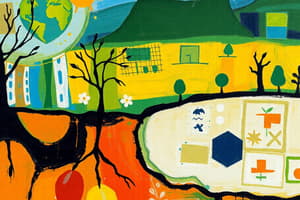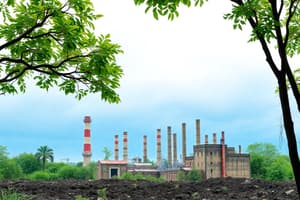Podcast
Questions and Answers
The concept of ______ development aims to meet the needs of the present without compromising the ability of future generations to meet their own needs.
The concept of ______ development aims to meet the needs of the present without compromising the ability of future generations to meet their own needs.
sustainable
One major global environmental issue is ______, which refers to the depletion of natural resources and ecosystems.
One major global environmental issue is ______, which refers to the depletion of natural resources and ecosystems.
resource depletion
Deforestation and industrialization are significant factors contributing to ______ issues in the interaction between man and the environment.
Deforestation and industrialization are significant factors contributing to ______ issues in the interaction between man and the environment.
environmental
The study of ______ science includes the examination of air, water, and pollution as key components of environmental quality.
The study of ______ science includes the examination of air, water, and pollution as key components of environmental quality.
The earth is divided into various ______ provinces, each characterized by distinct climate, vegetation, and wildlife.
The earth is divided into various ______ provinces, each characterized by distinct climate, vegetation, and wildlife.
Study Notes
Environmental Degradation
- Causes: Human activities like deforestation, pollution, overgrazing, mining, and urbanization.
- Effects: Soil erosion, loss of biodiversity, climate change, water scarcity, and health problems.
- Control: Sustainable practices, conservation efforts, pollution control measures, and responsible resource management.
Bio-geographic Provinces
- Definition: Distinct geographical regions with unique flora and fauna, influenced by climate, topography, and isolation.
- Examples:
- Nearctic: North America
- Neotropical: Central and South America
- Palearctic: Europe and Asia
- Afrotropical: Africa
- Indomalayan: South Asia and Southeast Asia
- Australasian: Australia, New Zealand, and surrounding islands
Sustainable Development
- Definition: Development that meets the needs of the present without compromising the ability of future generations to meet their own needs.
- Key Principles:
- Economic growth
- Social equity
- Environmental protection
Global Environmental Issues
- Climate Change: Rising global temperatures, extreme weather events, sea-level rise.
- Loss of Biodiversity: Extinction of species, habitat loss, and fragmentation.
- Pollution: Air, water, and soil contamination, affecting human health and ecosystems.
- Resource Depletion: Overuse and exhaustion of natural resources, such as fossil fuels, minerals, and forests.
Challenges
- Population Growth: Increased demand for resources and pressure on the environment.
- Consumption Patterns: Unsustainable consumption patterns and waste generation.
- Lack of Political Will: Insufficient commitment to sustainable practices and policies.
Earth, Man, and the Environment
- Interactions: Human activities directly impact the environment, leading to changes in the Earth's systems.
- Examples:
- Deforestation: Clearing of forests for agriculture and urban development, leading to soil erosion, loss of biodiversity, and climate change.
- Industrialization: Pollution from industries, contributing to climate change and health problems.
Resource Depletion, Waste Management, and Biodiversity
- Resource Depletion: Overuse of natural resources like water, minerals, and fossil fuels, leading to scarcity and conflict.
- Waste Management: The generation and disposal of waste, leading to pollution and environmental degradation.
- Biodiversity Loss: Extinction of species and loss of genetic diversity, impacting ecosystem stability and services.
Scope of Ecology
- Definition: Study of the interactions between organisms and their environment, focusing on energy flow, nutrient cycling, and population dynamics.
Environmental Science
- Definition: Multidisciplinary study of the relationships between humans and the environment, encompassing various topics like:
- Air Pollution: Air quality degradation by pollutants, causing health problems and climate change.
- Water Pollution: Contamination of water sources by human activities, impacting aquatic life and human health.
- Pollution: Global warming, ozone depletion, and acid rain caused by human activities.
Studying That Suits You
Use AI to generate personalized quizzes and flashcards to suit your learning preferences.
Description
Explore the causes and effects of environmental degradation, including specific human activities that contribute to this issue. Understand the concept of bio-geographic provinces and their ecological significance. Delve into sustainable development practices that aim to balance current needs with future generations' requirements.




